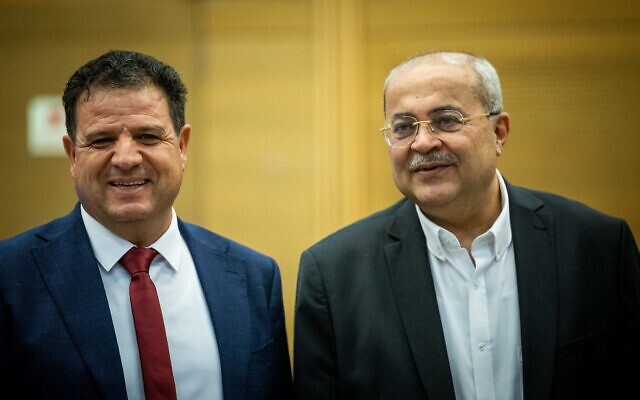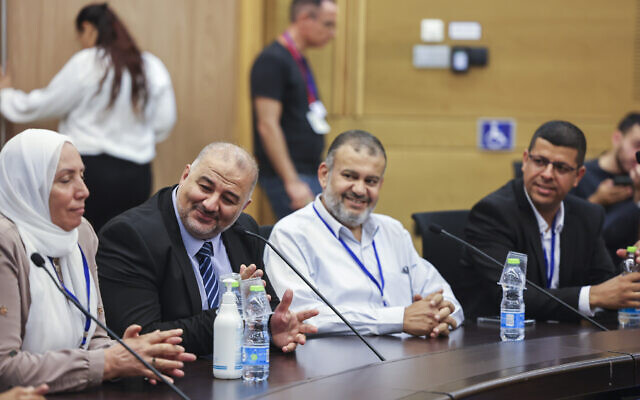Ayman Odeh predicts Hadash-Ta’al ‘will be the most important party’ after election if neither side has majority, though split from Balad largely seen as boon to Netanyahu’s bloc

The head of the Hadash-Ta’al alliance predicted his faction would be a major juggernaut in post-election coalition jockeying, after his erstwhile Joint List of Arab-led parties splintered into two separate slates Thursday night.
Ayman Odeh’s comments, following a surprise 11th hour decision to split with the hardline Balad party and run only as an alliance with Ta’al, reflected the shifting political dynamics created by the divorce, even as analysts questioned whether Hadash-Ta’al would manage to secure enough votes to return to the Knesset and be a player.
“We will be the most important party the day after elections,” Odeh, head of communist Hadash, told the press after submitting the joint slate alongside Ta’al head Ahmed Tibi Thursday night. “Everyone will come to us and we’ll make them wait in line until they respect us and our constituency.”
The split is widely predicted to help ease Likud leader Benjamin Netanyahu’s path back to power, with Balad predicted to fall well below the necessary 3.25% ballot threshold to enter the Knesset, a hurdle that may also challenge Hadash-Ta’al with voter turnout in Arab communities at a historic low.
Both Hadash-Ta’al and Balad blamed each other for the split Thursday, which came as the sides apparently failed to reach terms over a rotational agreement for the sixth slot on the electoral ticket.
Balad leader Sami Abou Shehadeh told the Kan public broadcaster that his faction has conceded to all of Hadash-Ta’al’s demands, claiming that they wanted to run independently.

But both Odeh and Tibi said they had sought to unify.
“We really wanted to preserve the Joint List. Ta’al even wanted to keep the Joint List with four parties,” Tibi said. “But it wasn’t possible.”
The fracturing of the Joint List would appear to benefit Netanyahu by diluting the influence of his most strident opponents.
However, without the hard-line Balad, Hadash and Ta’al might be more open to joining a coalition led by Prime Minister Yair Lapid, Netanyahu’s main opponent. It’s unclear, however, whether Lapid’s potential right-wing allies would accept such an alliance.
Arab political parties have traditionally shied away from joining Israeli governments; their refusal to act as difference-maker helped lead to successive electoral stalemates over the last three years.
Last year, the Islamist Ra’am Party split off from the Joint List to test the political waters from inside the government, saying that Arab communities were being left behind by politicians’ stubborn refusal to play ball. The party eventually blazed a path into Lapid’s coalition, though the move did not come without controversy among the party’s base; it also opened its right-wing political partners to attack from Netanyahu’s right-religious bloc, which portrayed the faction as terror supporters.

In a possible hint that Hadash and Ta’al may be considering following suit, Odeh tweeted electoral math that appeared to place his faction as a possible kingmaker.
“The right-wing bloc — 59 seats. The center-left bloc — 55 seats. Hadash-Ta’al — six seats,” Odeh wrote in a since deleted tweet. “The political reality that was created enables our list to have an influence and strongly demand that our issues be in the center.”
Odeh, who has headed the Joint List since it was formed in 2015, has watched as the alliance has crumbled. The party lost the Islamist Ra’am faction last year, as it split off and became the first independent Arab party to join a coalition, and has now also shed Balad.
Analysts largely saw the Joint List’s breakup as a boon to Netanyahu, with his right-wing religious bloc poised to benefit electorally from a failure of either Hadash-Ta’al or Balad to the Knesset and if predictions of low Arab turnout come to pass.
Polls prior to the split consistently had Netanyahu’s bloc finishing as the largest in the elections, but several seats short of a Knesset majority in an outcome that could further extend Israel’s political gridlock.
As reported by The Times of Israel
